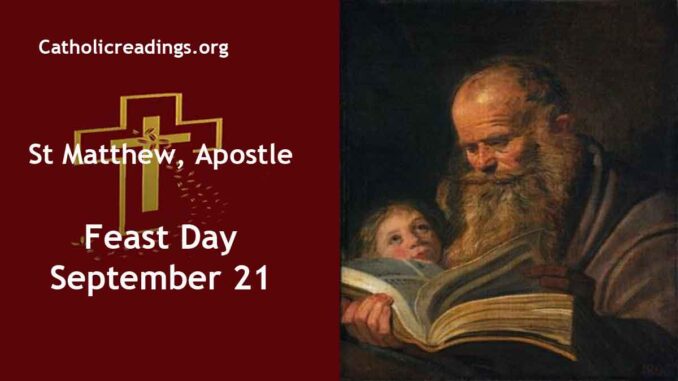St Matthew the Apostle is also known as Levi. He was one of the twelve apostles of Jesus. Before being called by Jesus, he was a tax collector.
He is the author of The Gospel of St Matthew. He preached the Gospel to the Jewish community in Judea and later went to other countries.
We celebrate his feast day on September 21 every year in the Catholic Church.
| Matthew the Apostle Biography | |
|---|---|
 |
|
| Date of Birth | 1st-century |
| Country of Birth | Judea, Palestine in the Roman Empire |
| Profession | Apostle of Jesus |
| Place of Work | Israel, Palestine, other Countries |
| Date of Death | 1st Century AD |
| Place of Death | Near Hierapolis or Ethiopia |
| Feast Day | September 21 |
| Beatification | Pre-Congregation |
| Canonization | Pre-Congregation |
| Patron Saint of | 1. Accountants 2. Salerno 3. Italy 4. Bankers 5. Tax collectors 6. Perfumers 7. Civil servants |
Table of contents
Saint Matthew FAQ
Judea, Palestine in the Roman Empire.
1 Century AD
1st Century AD
Near Hierapolis or Ethiopia
He did as a martyr
Alphaeus
It is only the Father, named Alphaeus, mentioned as a family member
Pre-Congregation
Pre-Congregation
September 21
1. Accountants
2. Salerno
3. Italy
4. Bankers
5. Tax collectors
6. Perfumers
7. Civil servants
1. Catholic Church
2. Eastern Orthodox Church
3. Eastern Catholic Churches
4. Oriental Orthodoxy
5. Church of the East
6. Anglican Communion
7. Lutheranism
Salerno, Italy
St Matthew’s Life History
One day, as Jesus was walking by the Sea of Galilee, He saw, sitting at the receipt of custom, Matthew, who was a tax collector for the rulers of the Roman Empire. Jesus said to him, “Follow Me;” and leaving all, Matthew arose and followed Him.
Tax collectors were considered by the Jews as sinners and the number one enemy of the people. This is because they were known to enrich themselves by extortion and fraud. No Scribe or Pharisee would sit with one at the table.
One day Matthew the Apostle made a great feast and invited Jesus, His disciples and a number of the Scribes and Pharisees.
Many tax collectors and sinners came and sat with Jesus and his disciples and eagerly listened to Him. The Scribes and the Pharisees began to murmur asking why Jesus dined with tax collectors and sinners.
Jesus offered a very good answer and said, “Those who are well, do not need a physician, but the sick do. Go and learn the meaning of the words, ‘I desire mercy, not sacrifice.’ I did not come to call the righteous but sinners.”
After the Ascension of Jesus, he remained for some years in Judea, and there wrote his gospel. Afterwards, he preached the Faith far and wide and it is believed that he finished his course in Parthia.
Passages in the Bible Where St Matthew is Mentioned
9 As Jesus passed on from there, he saw a man named Matthew sitting at the customs post. He said to him, “Follow me.” And he got up and followed him. Matthew 9:9
1 Then he summoned his twelve disciples and gave them authority over unclean spirits to drive them out and to cure every disease and every illness.
2 The names of the twelve apostles are these: first, Simon called Peter, and his brother Andrew; James, the son of Zebedee, and his brother John;
3 Philip and Bartholomew, Thomas and Matthew the tax collector; James, the son of Alphaeus, and Thaddeus;
4 Simon the Cananean, and Judas Iscariot who betrayed him. Matthew 10:1-4
13 When they entered the city they went to the upper room where they were staying, Peter and John and James and Andrew, Philip and Thomas, Bartholomew and Matthew, James son of Alphaeus, Simon the Zealot, and Judas son of James. Acts 1:13
Major Works
Matthew the Apostle is believed to be the author of the Gospel of Matthew.
Matthew the Apostle Major shrines, Churches or Sanctuaries
- Cathedral of St Matthew in Salerno, Italy
- St Matthew Catholic Cathedral in South Bend, Indiana, USA
- The Cathedral of St Matthew the Apostle in Washington D.C., USA
St Matthew Quotes

For from the fullness of the heart the mouth speaks.
A good person brings forth good out of a store of goodness, but an evil person brings forth evil out of a store of evil.
I tell you, on the day of judgment people will render an account for every careless word they speak.
By your words, you will be acquitted, and by your words, you will be condemned.” – Matthew 12:34-37
Related Links
Powered By SEO Experts
Follow @ReadingCatholic
